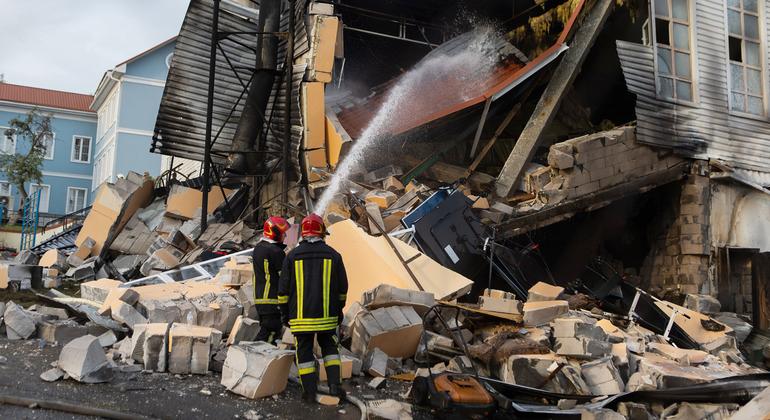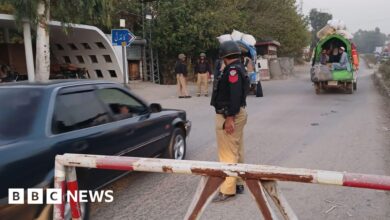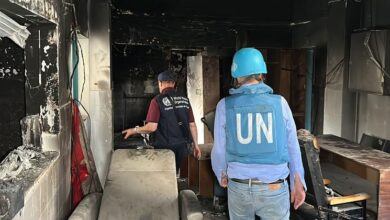World news in brief: Aid trucks on Ukraine frontlines, schools in Africa closed due to insecurity, Georgian rights defenders


Nearly 2,000 people still live in the town of Beryslav, including more than 70 children and 90 people with limited mobility.
“Despite the constant shelling, they have not evacuated the area, which has no electricity, no gas and no water, all because of the damaged infrastructure,” UN spokesman Stéphane Dujarric told reporters in New York.
Aid workers have provided a mobile power station, hygiene kits, bedding, blankets and warm clothes, he added.
Amid increased rocket and artillery attacks by Russian invading forces in recent days, nearly 30 civilians have been killed or injured in fighting in the Donetsk and Sumy regions.
Mandatory evacuation
“Homes, shops, agricultural properties and gas and electricity infrastructure have been damaged,” said Dujarric. “The Ukrainian government has told us that it has begun the mandatory evacuation of children and caregivers from 40 other towns and villages around the Donetsk Region.”
Wednesday saw a wave of Russian attacks kill a mother and her three daughters, among seven people killed in the western city of Lviv. A baby and another girl were also killed in drone and hypersonic missile strikes.
The attacks come after Russia’s deadliest attack of the year, which left 53 people dead in the central city of Poltava.
The head of the UN Children’s Fund office in Lviv, Nienke Voppen, told UN News on Thursday that 66 people in the city were also injured in Wednesday’s airstrikes, including ten children.
Violence and insecurity force 14,300 schools to close in West and Central Africa
More than 14,000 schools have been closed across West and Central Africa due to violence and insecurity, the United Nations aid coordination office, OCHA Have reported.
As of June this year, 2.8 million children – including many displaced children – had no access to education, from Mali in the west to the Democratic Republic of Congo in the east, OCHA said.
The latest aid assessments show a dire humanitarian situation in the region as security incidents affecting education increased by a staggering 103 percent from March to June compared to the beginning of the year.
Number of increase
The UN relief office also reported a slight increase in school closures between March and June compared to the previous three months, along with a small number of internally displaced people and refugees – adding to the pressure on services.
OCHA stressed that “huge” funding gaps continue to hamper the humanitarian response. The agency said only about a quarter of children in affected areas had access to education in the latest review period, compared to one in two at the start of the year.
Georgia: UN expert: Targeted and persistent repression of human rights defenders must end
Human rights defenders in Georgia have faced a “wave of repression” this year that shows no sign of abating, the UN Special Rapporteur on the situation of human rights defenders, Mary Lawlor, has said. said on thursday.
“At the end of 2023, I went to Georgia to check on the environment for human rights defenders in the country and things were on the brink of collapse,” Ms Lawlor said, adding that since then “the situation has deteriorated dramatically”.
United Nations Human Rights Council– The appointed independent expert cited the targeting of human rights defenders during the passage of the Foreign Influence Transparency Act by parliament earlier this year.
Enacted on May 28, 2024 despite widespread protests by the country’s population, the law, which places Georgia in breach of its human rights obligations regarding freedom of association and expression, came into effect on August 1.
“As the Government pushes its ‘foreign agent law’ through Parliament, human rights defenders have been subjected to brutal and targeted attacks,” Ms Lawlor continued.
“They were physically attacked, threatened by phone calls, and human rights organizations and their members saw their offices and homes smeared and threatened.”
Fan the flames
The Special Rapporteur stressed that these attacks were carried out with impunity and, in some cases, appeared to be encouraged by public statements from senior government officials.
“Government officials and members of the ruling party publicly smearing human rights defenders as enemies of the people continues to be a major problem in Georgia,” she said.
“These statements encourage and legitimize attacks on human rights defenders, and in the Georgian context it seems increasingly clear that this is exactly what they are aiming to do.”
Special Rapporteurs are appointed to monitor and report on specific country situations or thematic issues worldwide.
They are not employees of the United Nations and are independent of any government or organization. They serve in their personal capacity and receive no salary for their work.




